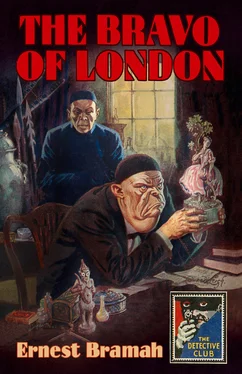‘Our efforts have been crowned with success,’ announced Mr Galton, beaming with satisfaction. ‘Mrs Hocking only stipulates for no late cooking.’
‘Famous,’ replied Dixson, a little more careless of his speech now that he had secured quarters. ‘I never tackle a heavy meal after sunset myself—insomnia.’
‘The question of terms I have left for your own arrangement. But I do not think that you will find Mrs Hocking too exacting.’
‘I’m sure. And you’ll remember your promise? I’m dying to see the celebrated twelfth-century canopied sedilia.’
‘You have heard of our unique Norman feature? Oh, really!’ It would have been impossible to strike a better claim on the vicar’s favour. ‘Really, Mr Dixson, I had no idea that you took an actual interest in ecclesiastical architecture.’
‘Well, naturally, I felt a deep regard for the church where my forefathers worshipped. Way out at home someone happened to be able to lend me a sort of guide to Sussex. I simply lapped it. Now I want to go over every nook and cranny in Tapsfield.’
‘So you shall; so you shall,’ promised the clergyman. ‘I will answer for it. We’ll arrange about the church as soon as you are settled.’ He had turned to go, but before Dixson was through the gate he heard his name called with a rather confidential import. ‘And, by the way, while I think of it. We have a little informal entertainment in the school house once a week—a, er, “penny reading” we call it.’
‘A sort of sing-song, I suppose?’
‘Precisely; but not in any way—er—boisterous. Well, we find it increasingly difficult sometimes—not that everyone isn’t most willing; quite the contrary, indeed, but what handicaps us with our limited material is to provide variety. Now I was wondering if you could be persuaded to give a little talk—it need only be quite short, of course—on “Life and Adventure in the Land of the Wombat”, or naturally, any other title that commends itself to you. You—? Well, think it over, won’t you?’
‘That was a tolerably soft shell,’ reflected Dixson, as he discreetly avoided discovering any of the interested eyes that had been following the details of his arrival from behind stealthily arranged curtains. ‘Now for Mrs Hocking—and the husband and daughter who work at the paper mill.’
CHAPTER II
JOOLBY DOES A LITTLE BUSINESS
STRANGERS who had occasion to visit Mr Joolby’s curio and antique shop—and quite a number of very interesting people went there from time to time—often had some difficulty in finding it at first. For Mr Joolby, in complete antagonism to modern business methods, not only did not advertise but seemed to shun the more obvious forms of commercial advancement. His address had never appeared in that useful compilation, the Post Office London Directory, and as yet—surely a simple enough matter—Mr Joolby had not taken the trouble to have the omission righted. The street in which he had set up, while far from being a slum, was not one of the better-known and easily remembered thoroughfares of the East End, so that collectors who stumbled on his shop (and occasionally discovered some surprising things there) more often than not found themselves quite unable to describe its exact position to others afterwards, unless they had the forethought at the time to jot down the number 169 and the name Padgett Street before they passed on elsewhere. ‘A couple of turns out of Commercial Road, somewhere towards the other end’ was as good as keeping a secret.
Nor would the inquirer’s search be finished once he reached Padgett Street, for with the modesty that marked his activity in sundry other ways, Mr Joolby had neglected to have his name proclaimed about his place of business or else he had allowed it to fade from the public eye under the combined erosion of time and English weather. Of the place of business itself little could be gleaned from outside, for the arrangement of the shop window was more in accord with Oriental reticence than in line with modern ideas of display. Dust and obscurity were the prevailing impressions.
Inside was an astonishing medley of the curious and antique and in this branch of his activities the dictum of an impressed collector did not seem unduly wide of the mark: that Mr Joolby could supply anything on earth, if only he knew where to put his hands upon it. And if the arrangement of the large room one first entered suggested more the massed confusion of an extremely bizarre furniture depository than any other comparison, it had what, to its proprietor’s way of thinking, was this supreme advantage: that from a variety of points of view it was possible to see without being seen, not only about the shop itself but even including the street and pavement.
At the moment that we have chosen for this intrusion—a time some weeks later than the arrival of ‘Anthony Dixson’ in Tapsfield—the place at a casual glance had all the appearance of being empty, for the figure of Won Chou, Mr Joolby’s picturesquely exotic shop assistant, both on account of absolute immobility and the protective obscuration of his drab garb, did not invite attention. But if unseen himself Won Chou was far from being unobservant and when a passer-by did not in fact pass by—when after an abstracted saunter up he threw an anxious glance along the street in both directions and then slipped into the doorway—a yellow hand slid out and in some distant part of the house the discreet tintinnabulation of a warning bell gave its understood message.
Inside the shop the visitor—no one could ever have mistaken him for a customer, unless, perhaps, qualified by ‘rum’—looked curiously about with the sharp and yet furtive reconnaissance of the habitual pilferer. But even so, he failed at the outset to discover the quiescent figure of Won Chou and he was experiencing a slight mental struggle between deciding whether it would be more profitable to wait until someone came or to pick up the most convenient object and bolt, when the impassive attendant settled the difficulty by detaching himself from the screening background and noiselessly coming forward. So quietly and unexpected indeed that Mr Chilly Fank, whose nerves had never been his strongest asset (the playful appellation ‘Chilly’ had reference to his condition when any risk appeared), experienced a momentary shock which he endeavoured to cover by the usual expedient of a weakly aggressive swagger.
‘’Ullo, Chink!’ he exclaimed with an offensive heartiness, ‘blimey if I didn’t take you for a ruddy waxwork. You didn’t oughter scare a bloke like that, making out as you wasn’t real. Boss in?’
‘Yes no,’ replied Won Chou with extreme simplicity and a perfect assurance in the adequacy of his answer.
‘Yes—no? Whacha mean?’ demanded Mr Fank, to whom suspicion of affront was an instinct. ‘Which, you graven image?’
‘All depend,’ explained Won Chou with unmoved composure. ‘You got come bottom side chop pidgin? You blong same pidgin?’
‘Coo blimey! This isn’t a bloomin’ restrong, is it, funny? I want none of yer chop nor yer pigeon either. Is old Joolby abart? If yer can’t speak decent English nod yer blinkin’ ’ed, one wei or the other. Get me, you little Chinese puzzle?’
‘My no sawy. Makee go look-see,’ decided Won, and he melted out of the shop by the door leading to the domestic quarters.
Читать дальше












